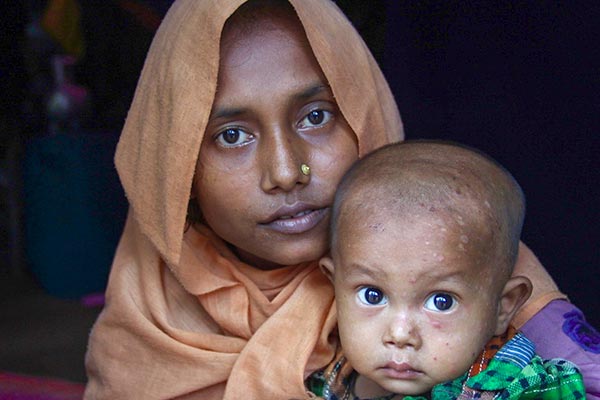Sick, tired, and hungry: Rohingya refugees face hardships in Bangladesh

Majuma* holds her son one-year-old son Rahmmot*, who is sick. They fled their village in Northern Rakhine State for safety in Bangladesh, but still face many hardships, including lack of clean water and food. Photo: Save the Children
“There were thousands of people fleeing. It took us five days to get to the border. There was heavy rainfall on the way and the tracks were steep, going up and down mountains,” explains Majuma.
Many Rohingya often arrive in Bangladesh having travelled with no access to clean water, nutritious food, and sanitation. As a result, many refugees require immediate medical attention and hygiene services.
“Life here is very hard. My son is sick; he has diarrhea and a fever. He also has spots all over his body, but I don’t know what it is. Most people here are getting sick. I already know of five people who have died here,” she says.
As of October 23, 2017, an estimated 603,000 Rohingya have crossed the border into Bangladesh from Myanmar. At least one third are in need of urgent nutrition support to prevent or treat malnutrition, including 145,000 children under the age of five and more than 50,000 pregnant and breastfeeding women.
Luckily for Majuma, Humanitarian Coalition member agency Save the Children provided her with a bamboo shelter, food, basic kitchen items, and hygiene items. As a result of donor support, Majuma now feels safer and better equipped in the Bangladesh camp she lives in.
However, with strong monsoon rains and poor access to clean drinking water, the risk of a cholera outbreak is high.
“Water is a big problem here for us. I have to go far away to fetch water, it takes half an hour each way and I need to go three times a day, says Majuma.
Humanitarian Coalition member agencies are on the ground, providing life-saving support. For instance, Save the Children has deployed nutrition experts and its Emergency Health Unit to address health concerns like Rahmmot’s. They are also there to provide breastfeeding support for women, treatment for infant malnutrition, primary healthcare, and psychosocial support for mothers.
More and more Rohingya people need access to critical healthcare and proper sanitation.